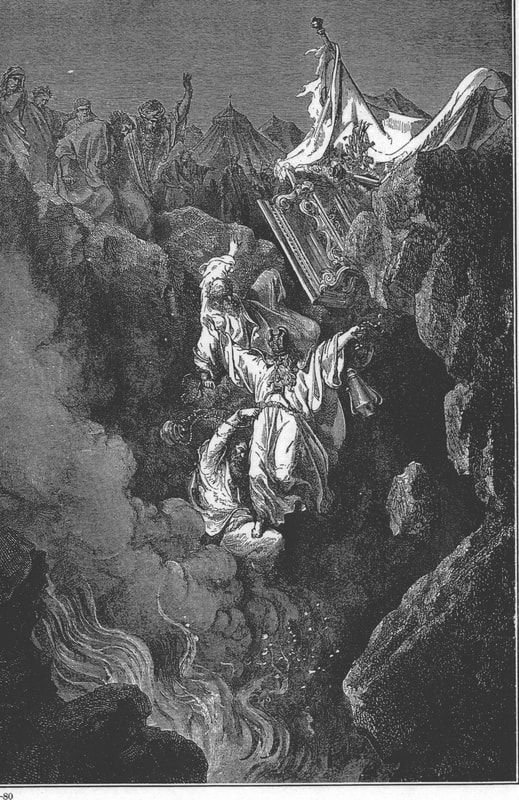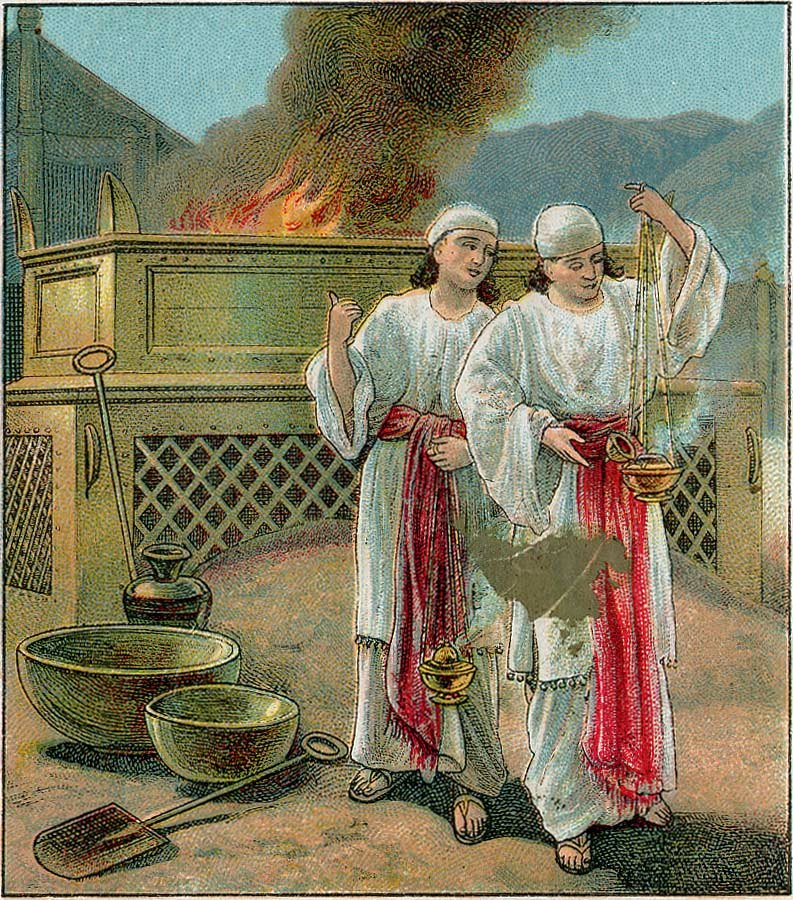|
One common theme raised throughout the general epistles is that of false teachers. This seems to have been a fairly constant issue in the early church, as it is referenced by every single author of a general epistle, discussed by Paul, and even briefly described in Acts. Jude, who sought to write a letter about salvation, instead found the need to address false teachers too pressing to delay. Peter, who spent his first letter largely concerned with salvation and Christian living, had to write (or at least dictate) a second that dealt heavily with false teachers. James, in a letter that is almost entirely about living out the gospel, found need to make a point about false teachers his audience needed to avoid. This was a rampant problem, and not one that has ever really gone away.
For who provoked [Him] when they had heard? Indeed, did not all those who came out of Egypt [led] by Moses? And with whom was He angry for forty years? Was it not with those who sinned, whose bodies fell in the wilderness? And to whom did He swear that they would not enter His rest, but to those who were disobedient? [So] we see that they were not able to enter because of unbelief. Hebrews 3:16-19 (NASB) The authors of the general epistles, when confronted with the notion of false teachers, thought back to the period after their ancestors left Egypt and before that congregation entered the promised land. There is much to be said about the apparent cultural importance of these events, that details of individuals such as Korah and Balaam found their way into the immediate thought processes of so varied a group of individuals. For now, however, we will focus on what these citations say about the false teachers of the day. Balaam 2 Peter mentions Balaam as an archetype of the teachings he was condemning in 2 Peter 2:13-16. Here, Balaam is described as loving "the wages of unrighteousness," and those who are seen to be following after his character are described as "...stains and blemishes, reveling in their deceptions, as they carouse with you, having eyes full of adultery that never cease from sin, enticing unstable souls, having a heart trained in greed, accursed children" (2 Peter 2:13b-14 NASB). In Jude 11, readers are warned that "for pay they have rushed headlong into the error of Balaam." John condemns the church in Smyrna, "'But I have a few things against you, because you have there some who hold the teaching of Balaam, who kept teaching Balak to put a stumbling block before the sons of Israel, to eat things sacrificed to idols and to commit [acts of] immorality" (Revelation 2:14 NASB). We know little about Balaam son of Beor, but the bulk of what we know is in Numbers 22-24, and we find in two different Biblical sources that he was later killed by the people of Israel while his town was being destroyed. The cultural understanding of what Balaam actually did must have drawn from other sources, however, because the actual narrative does not contain everything said of him here. Either way, the image being given of the false teachers of the day seem to include significant immoral behavior and an open enjoyment of their unrighteousness, as well as a certain amount of greed that drove Balaam to answer Balak's call after being told by God not to. This last point also indicates a disregard for God's command. In Revelation, Balaam is associated with the Nicolaitans, a heretical sect which held that spiritual freedom was a license to live immoral lives and seems to have been present in Thyatira and Pergamum as well. Given the emphasis on good works in James, it is distinctly possible that the groups he was addressing were, if not Nicolaitans, at least similar to them in doctrine. If Peter and Jude have the same understanding of Balaam as John does, which seems likely from their descriptions, then they might also have been addressing the rise of the Nicolaitan sect. Given the context of the phrase in which Jude's use of Balaam appears, he may have also been citing Balaam's involvement in Balak's jealous attempts to usurp the will of God through sacrifices and condemn God's people.
The stories detailed above both take place during the Exodus, which is also referenced at length in Hebrews, notable here because it was a formative period in the development of Judaism. There is a certain degree to which the Jewish authors of the general epistles can look back to the wandering in the wilderness as a definitive period in establishing their identity, religious expression, and the promises God had made to their people. While they appear to have generally understood the rise of the church as the fulfillment of many such promises, there seems to have been an acute understanding that there was something new at play in the world that was unlike anything that had come before. In such a formative period, that would define much of Christian identity, religious expression, and the nature of God's promises and fulfillment, it should not be a surprise that the minds of the generation that saw God descend in human form went to the generation that saw God descend on Sinai. But not every general epistle goes to that history, or even to that level of specificity.
Let not many [of you] become teachers, my brethren, knowing that as such we will incur a stricter judgment. For we all stumble in many [ways.] If anyone does not stumble in what he says, he is a perfect man, able to bridle the whole body as well. Now if we put the bits into the horses' mouths so that they will obey us, we direct their entire body as well. Look at the ships also, though they are so great and are driven by strong winds, are still directed by a very small rudder wherever the inclination of the pilot desires. So also the tongue is a small part of the body, and [yet] it boasts of great things. See how great a forest is set aflame by such a small fire! And the tongue is a fire, the [very] world of iniquity; the tongue is set among our members as that which defiles the entire body, and sets on fire the course of [our] life, and is set on fire by hell. For every species of beasts and birds, of reptiles and creatures of the sea, is tamed and has been tamed by the human race. But no one can tame the tongue; [it is] a restless evil [and] full of deadly poison. James 3:1-8 (NASB) The epistle of James is, primarily, a study of the Christian life, and some parts are debated as to their influence on the doctrine of salvation. But in chapter 3, James (while still discussing the general expectations of Christians) focuses in on teachers. The first verse sets the tone, that teaching is a risky venture, and the rest of the chapter expands on the idea that our speech cannot be trusted unless our tongue is tamed, and even this is beyond our ability to do alone. We tend to read this passage as a command to all Christians to watch our tongues, and it is certainly useful in this way, and not contradictory to the broader context in which it appears. The fact that it appears as a clarification of a warning to teachers means that we can also look at it as a solid text to examine the nature of false teachers. The warning is simple: teachers are held to a high standards of accountability for what they teach, and the means through which they teach is corrupt and in need of purification. Our tongues can guide our entire lives, especially if we make our living through speech, and if we do not have this under control everything else will suffer. In this way he is, somewhat indirectly, warning that the false teachers, those who do not have bridled tongues, who allow blessing and curses to come from the same source, will lead themselves and their hearers astray. Everything described in the rest of that chapter, when applied to the body at large, is a matter of significant concern. When applied to teachers, it is harrowing.
Jude, in one sentence, describes the false teachers of the day in a very concise way: "For they have gone the way of Cain, and for pay they have rushed headlong into the error of Balaam, and perished in the rebellion of Korah" (Jude 1:11 NASB). Balaam and Korah have been addressed already, and Cain is known for being jealous of his brother, offering improper sacrifice, and causing destruction and division. This all brings us to the big picture.
The general epistles, while addressing different audiences at somewhat different times, have a certain unity of description when addressing false teachers. They are described across the board as jealous, greedy, destructive and divisive, and dismissive of God's commands. This is all fine, and fairly easy to understand, and we can certainly apply the set to false teachers today; but probably the least clear common description best sums up the lot of them: these are people who would offer an improper sacrifice to God. But what does that even mean in a context where the sacrificial system is seen as superseded by a once-for-all sacrifice by Christ? Let's close this post by looking at that issue.
But you are A CHOSEN RACE, A royal PRIESTHOOD, A HOLY NATION, A PEOPLE FOR [God's] OWN POSSESSION, so that you may proclaim the excellencies of Him who has called you out of darkness into His marvelous light; for you once were NOT A PEOPLE, but now you are THE PEOPLE OF GOD; you had NOT RECEIVED MERCY, but now you have RECEIVED MERCY. 1 Peter 2:9-10 (NASB) Hebrews seems to be concerning itself with attempts to return to the Mosaic law rather than welcoming the freedom available in Christ, while authors like James and Jude are discussing teachers that are disregarding all semblance of righteous living in favor of wanton immorality. Both extremes end up doing the same ultimate thing: offering up to God a form of faith that is unacceptable to His standards, instead of relying on the accepted blood of Christ. All of the forms of false teaching end up rejecting the true Christ and His work in favor of a religion that is, in the end, empty. The motives of false teachers may vary, but the end result is always taking the people of God and offering through them a lifestyle that will be rejected by Him.
In contrast, then, the teacher who is honoring God properly is one who operates out of humility rather than jealousy, charity rather than greed, seeking unity and seeing life blossom in their congregations rather than destruction and division, respectful of God's commands without being legalistic, and leaning on the sacrifice of Christ rather than offering up a life that is marked by corruption. But the true mark of a sound teacher is the salvation they preach, and this will be the topic of the next post.
0 Comments
Leave a Reply. |
Scripture quotations taken from the NASB. Copyright by The Lockman Foundation
Archives
January 2023
Categories
All
|



 RSS Feed
RSS Feed
